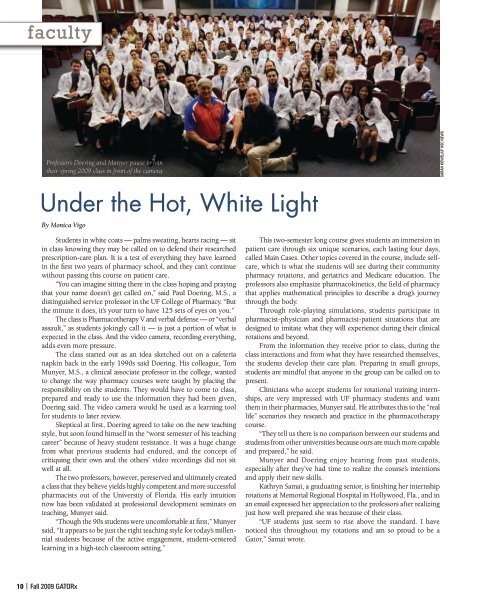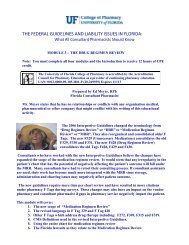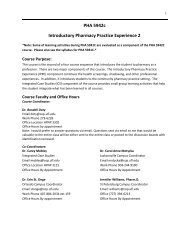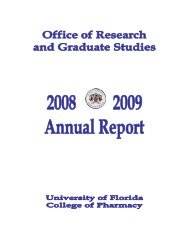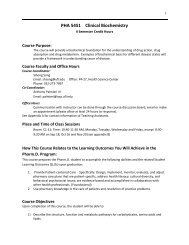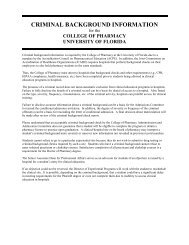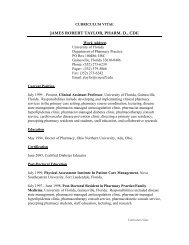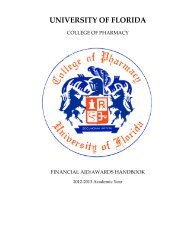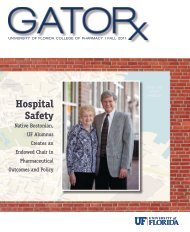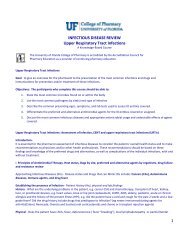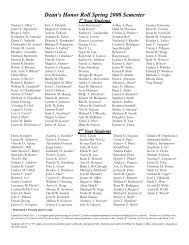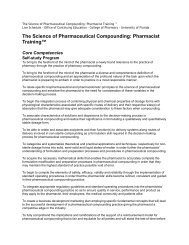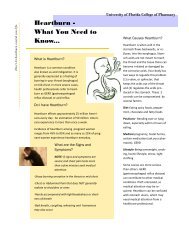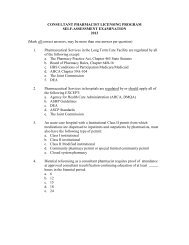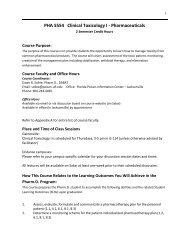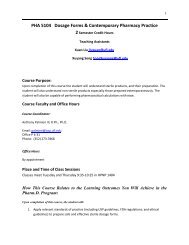Florida Tomorrow is a Place… - College of Pharmacy - University of ...
Florida Tomorrow is a Place… - College of Pharmacy - University of ...
Florida Tomorrow is a Place… - College of Pharmacy - University of ...
You also want an ePaper? Increase the reach of your titles
YUMPU automatically turns print PDFs into web optimized ePapers that Google loves.
faculty<br />
Pr<strong>of</strong>essors Doering and Munyer pause to join<br />
their spring 2009 class in front <strong>of</strong> the camera.<br />
Under the Hot, White Light<br />
By Monica Vigo<br />
Students in white coats — palms sweating, hearts racing — sit<br />
in class knowing they may be called on to defend their researched<br />
prescription-care plan. It <strong>is</strong> a test <strong>of</strong> everything they have learned<br />
in the first two years <strong>of</strong> pharmacy school, and they can’t continue<br />
without passing th<strong>is</strong> course on patient care.<br />
“You can imagine sitting there in the class hoping and praying<br />
that your name doesn’t get called on,” said Paul Doering, M.S., a<br />
d<strong>is</strong>tingu<strong>is</strong>hed service pr<strong>of</strong>essor in the UF <strong>College</strong> <strong>of</strong> <strong>Pharmacy</strong>. “But<br />
the minute it does, it’s your turn to have 125 sets <strong>of</strong> eyes on you.”<br />
The class <strong>is</strong> Pharmacotherapy V and verbal defense — or “verbal<br />
assault,” as students jokingly call it — <strong>is</strong> just a portion <strong>of</strong> what <strong>is</strong><br />
expected in the class. And the video camera, recording everything,<br />
adds even more pressure.<br />
The class started out as an idea sketched out on a cafeteria<br />
napkin back in the early 1990s said Doering. H<strong>is</strong> colleague, Tom<br />
Munyer, M.S., a clinical associate pr<strong>of</strong>essor in the college, wanted<br />
to change the way pharmacy courses were taught by placing the<br />
responsibility on the students. They would have to come to class,<br />
prepared and ready to use the information they had been given,<br />
Doering said. The video camera would be used as a learning tool<br />
for students to later review.<br />
Skeptical at first, Doering agreed to take on the new teaching<br />
style, but soon found himself in the “worst semester <strong>of</strong> h<strong>is</strong> teaching<br />
career” because <strong>of</strong> heavy student res<strong>is</strong>tance. It was a huge change<br />
from what previous students had endured, and the concept <strong>of</strong><br />
critiquing their own and the others’ video recordings did not sit<br />
well at all.<br />
The two pr<strong>of</strong>essors, however, pereserved and ultimately created<br />
a class that they believe yields highly competent and more successful<br />
pharmac<strong>is</strong>ts out <strong>of</strong> the <strong>University</strong> <strong>of</strong> <strong>Florida</strong>. H<strong>is</strong> early intuition<br />
now has been validated at pr<strong>of</strong>essional development seminars on<br />
teaching, Munyer said.<br />
“Though the 90s students were uncomfortable at first,” Munyer<br />
said, “It appears to be just the right teaching style for today’s millennial<br />
students because <strong>of</strong> the active engagement, student-centered<br />
learning in a high-tech classroom setting.”<br />
10 | Fall 2009 GAtORx<br />
Th<strong>is</strong> two-semester long course gives students an immersion in<br />
patient care through six unique scenarios, each lasting four days,<br />
called Main Cases. Other topics covered in the course, include selfcare,<br />
which <strong>is</strong> what the students will see during their community<br />
pharmacy rotations, and geriatrics and Medicare education. The<br />
pr<strong>of</strong>essors also emphasize pharmacokinetics, the field <strong>of</strong> pharmacy<br />
that applies mathematical principles to describe a drug’s journey<br />
through the body.<br />
Through role-playing simulations, students participate in<br />
pharmac<strong>is</strong>t-physician and pharmac<strong>is</strong>t-patient situations that are<br />
designed to imitate what they will experience during their clinical<br />
rotations and beyond.<br />
From the information they receive prior to class, during the<br />
class interactions and from what they have researched themselves,<br />
the students develop their care plan. Preparing in small groups,<br />
students are mindful that anyone in the group can be called on to<br />
present.<br />
Clinicians who accept students for rotational training internships,<br />
are very impressed with UF pharmacy students and want<br />
them in their pharmacies, Munyer said. He attributes th<strong>is</strong> to the “real<br />
life” scenarios they research and practice in the pharmacotherapy<br />
course.<br />
“They tell us there <strong>is</strong> no compar<strong>is</strong>on between our students and<br />
students from other universities because ours are much more capable<br />
and prepared,” he said.<br />
Munyer and Doering enjoy hearing from past students,<br />
especially after they’ve had time to realize the course’s intentions<br />
and apply their new skills.<br />
Kathryn Samai, a graduating senior, <strong>is</strong> fin<strong>is</strong>hing her internship<br />
rotations at Memorial Regional Hospital in Hollywood, Fla., and in<br />
an email expressed her appreciation to the pr<strong>of</strong>essors after realizing<br />
just how well prepared she was because <strong>of</strong> their class.<br />
“UF students just seem to r<strong>is</strong>e above the standard. I have<br />
noticed th<strong>is</strong> throughout my rotations and am so proud to be a<br />
Gator,” Samai wrote.<br />
SARAH KiEWEL/UF HSC NEWS


